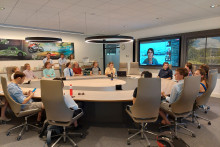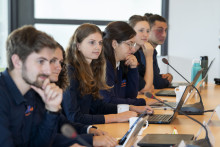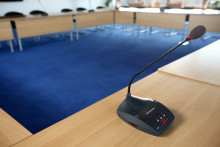For student parties DAS and UReka, the mutual status quo is maintained. For the third year in a row, six seats go to UReka and three to DAS. Of the almost 12.5 thousand UT students entitled to vote, 2717 voted. This brought the turnout percentage among students to 21.77 percent.
This percentage is relatively high compared to other universities in the Netherlands, according to UT vice-president Machteld Roos, who announced the results of the election this afternoon. But by UT standards, the turnout percentage has not been this low for a long time. To illustrate: in the two previous corona years, 28.42 percent (2021) and 31 percent (2020) voted, respectively.
Satisfied with seats, dissatisfied with turnout
List leaders Robin van Zutphen (DAS) and Tim Achterkamp (UReka) are satisfied with the election results. 'We came very close to securing four seats this year, so all compliments to the campaign team', says Van Zutphen. UReka had to deal with some setbacks during their election campaign, according to Achterkamp. 'These are hectic weeks. But suddenly we also had four people on our list who fell ill and were therefore not available. But I am happy that we were able to retain six seats.'
The turnout percentage is less satisfactory to both party leaders. 'Even though, from a national point of view, it is not so bad. But it is a significant drop compared to previous years', says Achterkamp. Van Zutphen agrees. 'Maybe it is unfamiliarity, or that students have to overcome a certain threshold. While campaigning, we even noticed that the multifactor authentication (to get to the digital ballot box, ed.) was already too high a threshold for some.'
Is there work to be done for the parties, do they think? 'I think that we can show more of what we do and what the importance of the University Council is. But the other side of the coin is also welcome,' Achterkamp says.
'Outcome as expected'
The election results among the employees ended predictably, says Herbert Wormeester, list leader of Campus Coalition and chairman of the council. 'It is an outcome as expected. Still, I'm happy with the turnout (30.01 per cent, ed.). Beforehand, the question was whether there was anything to choose. The fact that still 30 percent of the employees voted is significant and positive.'
The University Council can always work on visibility, says Wormeester. 'After all, we deal with important issues that have an impact on the entire community. For example, the corona scenarios and the associated measures; everything that is dark green or pitch black is easy to fill in. But everything in between, there is a lot at stake.'







